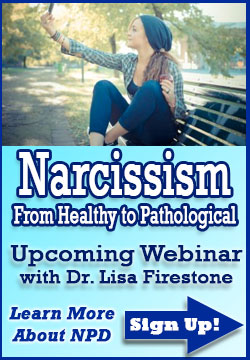Self-Esteem vs. Narcissism

As a culture, we are highly concerned with self-esteem. And this is a good thing. How we feel about ourselves determines how we treat those around us and vice versa. In 1890, William James identified self-esteem as a fundamental human need, no less essential for survival than emotions such as anger and fear. And yet, we often fail to measure the many distinctions between self-esteem and vanity, or we fail to understand how our actions and reactions can serve to bolster one as opposed to the other.
Terror management theorist Dr. Sheldon Solomon makes the point that self-esteem is “controversial as some claim that it is vitally important for psychological and interpersonal well-being, while others insist that self-esteem is unimportant or is associated with increased violence and social insensitivity.” He goes on to say that “those who claim that high self-esteem is problematic and associated with increased aggression are either willfully or unwittingly confusing and [equating] self-esteem with narcissism.”
The distinction between self-esteem and narcissism is of great significance on a personal and societal level. Self-esteem differs from narcissism in that it represents an attitude built on accomplishments we’ve mastered, values we’ve adhered to, and care we’ve shown toward others. Narcissism, conversely, is often based on a fear of failure or weakness, a focus on one’s self, an unhealthy drive to be seen as the best, and a deep-seated insecurity and underlying feeling of inadequacy. So where do these attitudes come from? And why do we form them?
In our new book, The Self Under Siege, my father, psychologist and author Robert Firestone, and I write, “Vanity is a fantasized image of the self that is formed when parents substitute empty praise and a false buildup for the real love and acknowledgment they have failed to provide to their child.” Such parents leave their children feeling unseen and with a sense of pressure to be someone they aren’t. On the other hand, parents who are attuned to their children and genuinely responsive to them leave their offspring feeling seen and validated. These children grow up with an accurate sense of who they are and with healthy self-esteem.
Studies have shown that children offered compliments for skills they haven’t mastered or talents they do not possess are left feeling as if they’d received no praise at all, often even emptier and less secure. Only children praised for real accomplishments were able to build self-esteem. The others were left to develop something far less desirable — narcissism. Unnatural pressure or unearned buildup can lead to increased insecurities and anxieties that foster narcissism over self-confidence.
 Narcissism encourages envy and hostile rivalries, where self-esteem supports compassion and cooperation. Narcissism favors dominance, where self-esteem acknowledges equality. Narcissism involves arrogance, where self-esteem reflects humility. Narcissism is affronted by criticism, where self-esteem is enhanced by feedback. Narcissism makes it necessary to pull down others in order to stand above them. Self-esteem leads to perceiving every human being as a person of value in a world of meaning.
Narcissism encourages envy and hostile rivalries, where self-esteem supports compassion and cooperation. Narcissism favors dominance, where self-esteem acknowledges equality. Narcissism involves arrogance, where self-esteem reflects humility. Narcissism is affronted by criticism, where self-esteem is enhanced by feedback. Narcissism makes it necessary to pull down others in order to stand above them. Self-esteem leads to perceiving every human being as a person of value in a world of meaning.
Society plays a role in fostering self-esteem or narcissism. Dr. Solomon explains, “Self-esteem is ultimately a cultural construction, because the standards of value by which people judge themselves are derived from adhering to social standards.” These standards can either provide ways for people to feel good about themselves, or they can promote unrealistic expectations that can only destroy self-esteem. Solomon comments that in America, a man has to be rich and successful, and a woman has to be “young and thinner than a piece of linguini, and that’s impossible.” He states:
Our kids are taught at a very early age to adhere to a set of values that is not realistically attainable for the average individual. And so it shouldn’t surprise us that a third of the American population is depressed and another third is addicted to drugs and alcohol, and the final third is watching television or shopping at [the super store] for a chain saw or a lemon.
When Dr. Solomon and his colleagues, Jeff Greenberg and Tom Pyszczynski, developed terror management theory, one of the questions they asked was: What is the significance of self-esteem? Their research uncovered important answers to their question and incidentally underscored the reason why, as William James noted, “Self-esteem is a fundamental human need, essential for survival.” Their findings showed that a powerful and potentially productive shield against existential anxieties inherent in our human condition is the feeling that we are each a valuable member of a meaningful universe.
Dr. Solomon and his colleagues have posited that existential awareness and the attempts to avoid death anxiety have contributed significantly to many of the world’s wars and political conflicts. Conversely, both Dr. Solomon and Robert Firestone argue that when death awareness isn’t denied but recognized, it can be used to promote peace and compassion. The idea that we are all in the same boat, albeit a sinking boat (as Solomon indicates), promotes a sense of equality and togetherness. The acknowledgement that our physical selves share the same fate and that we all have the same fears, can help us to be more understanding of one another’s limitations.
Feeling good about yourself as a person and acceptable for who you are allows you to move through your life with a sense of purpose, meaning, and value. Ernest Becker wrote, “the seemingly trite words ‘self-esteem’ are at the very core of human adaptation.” In order to gain a sense of self, we must perceive ourselves as valuable members of a society that means something. Giving back and offering compassion, aid, and empathy are key to realizing our value. When we acknowledge that our time on earth is fleeting, we accept the painful reality that gives each action more weight, each moment more poignancy. It also gives us a great opportunity to take advantage of the time we have and the people we share this time with. Thus, building self-esteem is about building beyond ourselves, a sense of community, camaraderie, and equality among our fellow human beings.
On June 12, I will join Dr. Sheldon Solomon for the CE Webinar, “Self-Esteem: the Belief that One is a Valuable Contributor to a Meaningful Universe,” in which he will explore how productive and creative efforts to increase self-esteem can be a healthy response to anxiety aroused by our awareness of our mortality.
Learn more or register for the June 12 Webinar, “Self-Esteem” with Dr. Sheldon Solomon
Tags: confidence, critical inner voice, defenses, ego, narcissism, personal growth, psychological advice, psychological tips, self development, self-awareness, self-esteem, self-limiting behavior, self-understanding, vanity










Self-esteem plays a very important role in romantic relationships. It influences our emotions, how we perceive our partner, how we think that our partner perceives us.
I am so confused about all of this. I don’t see how it is possible to place any value on me. Other people might do so. I have been called narcissistic by a few people but, according to the definition provided here, I can see that those people had no idea what it meant. There is only one thing that I can see as adding value to my life and that is the fact that another person depends on me for financial support but that’s it. If I had a life insurance policy, that value would balanced out. Keep in mind that I am a person with truly no feeling. Nada, Zilch, Zero. Think of me as Spock from Star Trek with the difference being that Spock was a stressed out emotional train wreck in comparison to me. How do you place value on yourself?
Guy,
No feeling for others may be one of many signs of Narcissism, but no feeling toward yourself and no self-value speaks of deep trauma and detachment. Perhaps it is time to reconnect – with your body, your thoughts, your spirit, and your feelings may begin to follow. Notice and validate what is going on in your body as you read this and responding with expression to it will lead you forward. Perhaps give it a go and see what happens rather than think/rationalise your response…